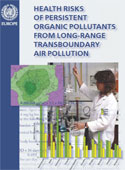Health risks of persistent organic pollutants from long-range transboundary air pollution

Download
Persistent organic pollutants (POPs) are organic compounds of anthropogenic origin that resist degradation and accumulate in the food-chain. They can be transported over long distances in the atmosphere, resulting in widespread distribution across the earth, including regions where they have never been used. Owing to their toxicity, they can pose a threat to humans and the environment.
This publication, based on contributions from an international group of experts, provides a concise review of the available evidence on the characteristics of 13 groups of POPs (pentachlorophenol, DDT, hexachlorocyclohexanes, hexachlorobenzene, heptachlor, polychlorinated dibenzo-p-dioxins and dibenzofurans, polychlorinated biphenyls, polycyclic aromatic hydrocarbons, polychlorinated terphenyls, polybrominated diphenylethers, polybrominated dibenzo-p-dioxins and dibenzofurans, short-chain chlorinated paraffins and ugilec). It reviews pathways of human exposure related to the long-range transport of the POPs through the tmosphere, and the potential hazards associated with them. The review concludes with an expert assessment of the risks to health associated with exposure due to the long-range transport of each of the pollutants.
It is intended that the assessment will serve to strengthen the commitment of the parties to the Convention on Long-range Transboundary Air Pollution to improve air quality in Europe and to prevent adverse effects of air pollution on human health.



